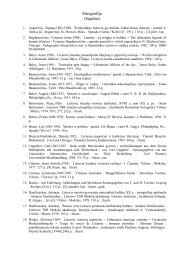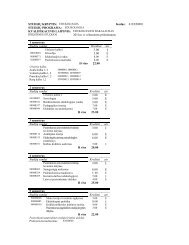2013,1 (62) - KlaipÄdos universitetas
2013,1 (62) - KlaipÄdos universitetas
2013,1 (62) - KlaipÄdos universitetas
You also want an ePaper? Increase the reach of your titles
YUMPU automatically turns print PDFs into web optimized ePapers that Google loves.
Anne Koskiniemi, Juha Perttula<br />
Team leaders do not have a formal organizational position of manager, but they do<br />
have the position of leader given by the group members themselves. Results illustrate<br />
the core experiential structures of received positive feedback in this kind of leader<br />
position in an organization. These core structures can be interpreted as ties between<br />
team leaders and certain situational features of their work. From this perspective, any<br />
positive experience in an organization is like glue that is forming and re-forming<br />
working communities, creating belongingness and reinforcing mutual trust. Congruent<br />
with this interpretation, results show that received positive feedback may attach team<br />
leaders more to managers than to the group members without whom the position of the<br />
leader would not even exist. Positive feedback has the power to bring people together.<br />
The results also show the limits of this positive power. The willingness of team<br />
leaders to accept and receive positive feedback appears to be crucial. The key to this<br />
seems to be the experienced closeness to the feedback giver. More research is needed<br />
about the mechanisms that underlie how experiences of close relations are formed in<br />
organizations. Based on this study, giving or receiving positive feedback is not the<br />
origin of the close relationships. Something experientially essential between persons is<br />
occurring before the positive feedback can be truly effective.<br />
While several studies have concluded that positive feedback is associated with<br />
improved job performance (Becker & Klimoski, 1989; Jaworski & Kohli, 1991; London<br />
et al., 1999; Chakrabarty et al., 2008) or task performance (Oettingen et al., 2012;<br />
Plakht et al., 2012), it is notable that this was not found in our study. It shows that<br />
when studying received positive feedback as an experienced phenomenon, positive<br />
feedback is not necessary for good job performance. The motives of performing a<br />
team leader's work well are not external – given positive feedback is not required.<br />
However, the motive of good job performance is neither internal nor subjective.<br />
Grounded in the results of this study, the effects of positive feedback are intervened by<br />
a recipient's personal interpretation or evaluation of the feedback. In our view, this<br />
interpretation should not be considered as a subjective or intrinsic motive. Preferably,<br />
the motive for good job or task performance lies in the holistic relations between the<br />
intentional person and the factual setting she is working with. The motive to perform<br />
well, then, is relational, and the aim of positive feedback is to facilitate these relations.<br />
Received 2012 11 12<br />
Approved for publishing <strong>2013</strong> 03 05<br />
References<br />
Andrews, M. C., Kacmar, K. M. (2001). Confirmation and extension of the sources of feedback scale in service-based<br />
organizations. Journal of Business Communication 38(2): 206–226.<br />
Anseel, F., Lievens, F. (2006). Certainty as a moderator of feedback reactions? A test of the strength of the selfverification<br />
motive. Journal of Occupational and Organizational Psychology 79(4): 533–551.<br />
Ashford, S. J., Blatt, R., VandeWalle, D. (2003). Reflections on the looking glass: A review on feedback-seeking<br />
behavior in organizations. Journal of Management 29(6): 773–799.<br />
Bell, S. T., Arthur, W. Jr. (2008). Feedback acceptance in developmental assessment centers: the role of feedback<br />
message, participant personality, and affective response to the feedback session. Journal of Organizational Behavior<br />
29(5): 681–703.<br />
72

















